Last Updated on August 2, 2021
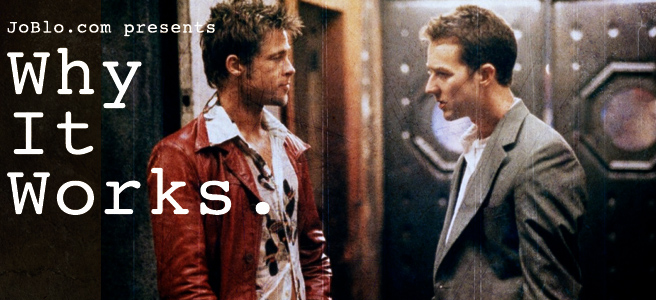 Why It Works is an ongoing column which breaks down some of the most acclaimed films in history and explores what makes them so iconic, groundbreaking, and memorable.
Why It Works is an ongoing column which breaks down some of the most acclaimed films in history and explores what makes them so iconic, groundbreaking, and memorable.
****SPOILERS AHEAD****
Mischief. Mayhem. Soap. Like many of the most celebrated films in history, FIGHT CLUB was a disappointment at the box office. Whether marketing, expectations, or the sheer uniqueness and irreverence of David Fincher's film are to blame, audiences were quick to discover it following its theatrical run and adopt it as the absent father of a generation. Here's why it works:
WHY WE LIKE THE CHARACTERS:
Like a perverse version of THE WIZARD OF OZ, FIGHT CLUB sees a bored, frustrated protagonist thrust into a new and exciting world. We're never told his name, because we already know him. He is the quintessential everyman. The narrator suffers from insomnia and speaks about his job and his IKEA-furnished condo in a monotone, overtired voiceover. He's not cool or exciting, but we see ourselves in him and can't help but put ourselves in his corner.
Meanwhile, Tyler Durden comes along- the opposite of the narrator. All the ways you wish you could be, that's him. He looks like you want to look; he f*cks like you want to f*ck; he is smart, capable, and most importantly, he is free in all the ways that you are not. While we see our actual selves in the narrator (and maybe languish at the recognition), we are instantly excited by Tyler's thrift store chic, come what may, live in the now mentality. We may not empathize with or root for him, but he is an absolute breath of fresh air next to the narrator, and we can't wait to see what he'll do next.
 "If you wake up at a different time in a different place, could you wake up as a different person?"
"If you wake up at a different time in a different place, could you wake up as a different person?"
WHY WE CARE:
"Tyler gets me a job as a waiter, after that Tyler's pushing a gun in my mouth and saying, the first step to eternal life is you have to die." Much like the first sentence of Chuck Palahniuk's novel, the opening moments of FIGHT CLUB promise an intense ride with plenty of loop-the-loops along the way. The first few minutes play almost like the overture to a musical, touching on the melodies of all the big numbers, including "Project Mayhem," "Marla," "Bitchtits Bob," "I Couldn't Sleep," "IKEA Montage," and the show-stopping favorite, "In Two Minutes Primary Charges Will Blow Base Charges (And A Few Square Blocks Will Be Reduced To Smoldering Rubble)."
The narrator's insomnia creates a small conflict for us to cling to at the start, but it's quickly resolved once he discovers the release of support groups. The relief only lasts until Marla Singer, the narrator's new ailment, walks into his life. Cut to an exploded apartment, a pugilistic soap salesman, and an army of nihilistic space monkeys, and the tension just keeps building from a meager sleep condition into a final plan to wipe the financial slate clean. Another keyword here is comedy. FIGHT CLUB could be presented as a heavy-handed, philosophical thriller, but Fincher and company keep the whole show very tongue-in-cheek, allowing us to laugh and be entertained while also latching onto the deeper sentiments at our own discretion.
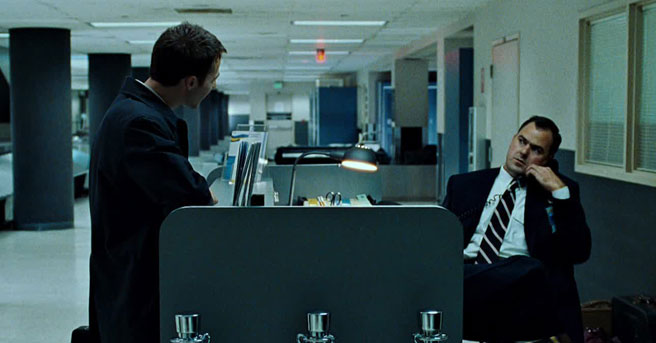 "Of course, it's company policy never to imply ownership in the event of a dildo. We have to use the indefinite article *a* dildo, never… *your* dildo."
"Of course, it's company policy never to imply ownership in the event of a dildo. We have to use the indefinite article *a* dildo, never… *your* dildo."
WHY WE'RE SATISFIED:
Going back to the WIZARD OF OZ comparison, FIGHT CLUB, much like the 1939 classic, eventually reveals the main character's own imagination as the impetus for the entire plot. For a movie whose climax involves an entire financial district being razed to the ground, the real resolution of the story lies in the narrator's triumph over himself. By killing Tyler, the narrator finally merges his frustrated consumerist self with his ideal dream self. It's a happy ending with a slain villain and an evolved hero, the latter standing hand in hand with his princess while, around them, the world burns (and splice in a single frame of male genitalia for good measure).
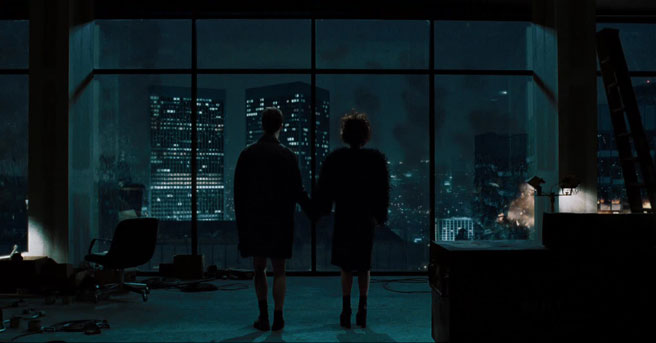 I used to work in those last two buildings in LA's financial district. It seemed apropos to have this shot as my desktop wallpaper.
I used to work in those last two buildings in LA's financial district. It seemed apropos to have this shot as my desktop wallpaper.
WHY WE REMEMBER:
While the overarching story is all well and good, it's everything else that keeps us coming back for more. On style, Fincher marries the grittiness of SEVEN with the technical cleanliness we would come to see in his later films for a unique look all its own- and that's without even getting into Tyler and Marla's impeccable style. We're also introduced to plenty of new concepts we've never seen on film or, probably, in life, from the narrator's grisly job to the process of making soap/dynamite/chemical kiss burns to fight clubs to the big reveal at the end, we're treated to a cavalcade of novelty. Finally, the writing. Not only does the comedy of the film make for plenty of quotable lines (I dare you to hear someone described as being clever without wanting to ask how it's working out for them), but the philosophy behind the film can be talked about for hours. Speaking to our constant struggle to find the balance between complacent nine-to-fiver and anarchic cult leader, FIGHT CLUB serves as an anthem for the spiritual war of a generation.
I want to open a movie theater just to screen these at the front of everything we show.
Thoughts? What else worked for you? What didn't? Strike back below!
If you have any movies you'd like to see put under the microscope, let us know below or send me an email at [email protected].







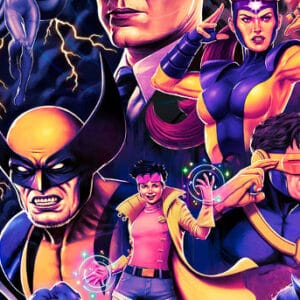
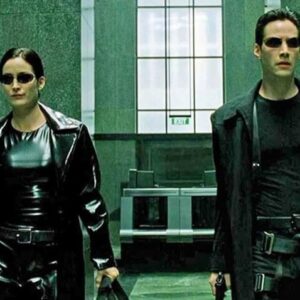











Follow the JOBLO MOVIE NETWORK
Follow us on YOUTUBE
Follow ARROW IN THE HEAD
Follow AITH on YOUTUBE